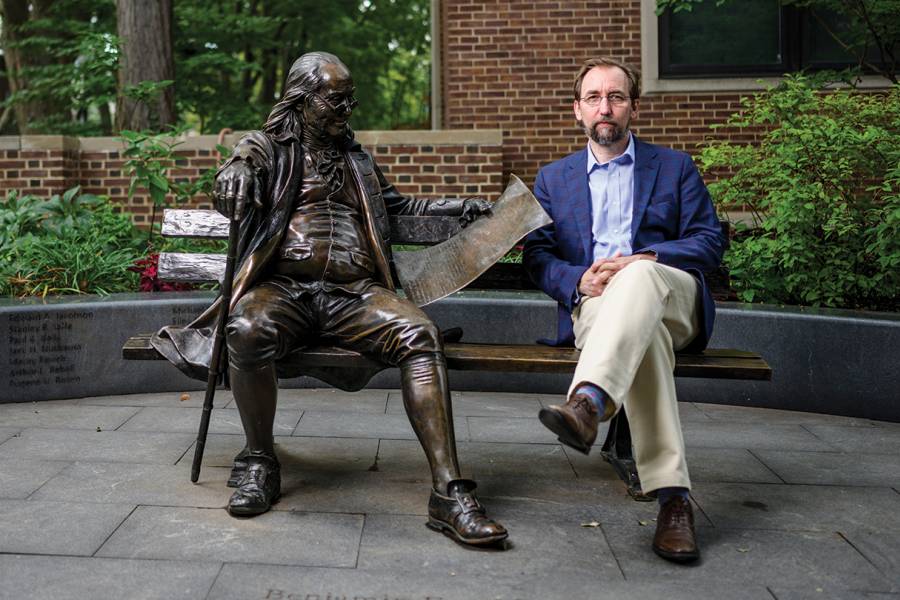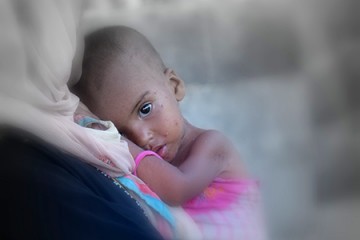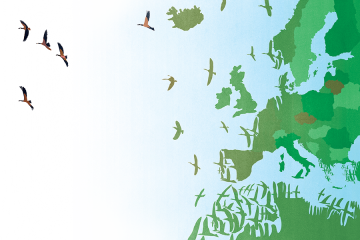Zeid Ra'ad Al Hussein smiles and laughs a lot. As someone who has witnessed the aftermath of genocide and feels the world is set on an authoritarian trajectory in which human rights are increasingly fragile, you might think he'd be more sullen.
But at nearly every step of his life, Al Hussein, A&S '87, has defied convention. He's a Muslim and supporter of LGBTQ rights. He's a career diplomat who often tramples the protocols of diplomacy. He was born into royalty—the son of Prince Ra'ad of the Hashemite House, the ruling royal family of Jordan—but he'd rather you just call him Zeid and eschew formality. He's Jordanian and married a woman from Texas, born to British parents. He found his way to the United Nations almost by accident, and then worked his way up to the highest rungs of the ladder.
Al Hussein, a former Jordanian diplomat, served as his home country's ambassador to the United States and the United Nations (on two occasions), before being selected as the U.N.'s sixth high commissioner for human rights, a post he occupied from 2014 to 2018. During a tenure that saw flagrant human rights abuses in Syria, Myanmar, and elsewhere, he earned a reputation for being courageous and outspoken. In a 2016 speech at The Hague, Al Hussein shocked those in attendance when he called out the silence of world leaders—by name—in the face of atrocities and human rights violations, and warned against populists and demagogues in Europe and the United States. He received a standing ovation. He stepped down from his position in September 2018, saying that the current geopolitical climate had made it challenging to do the job with independence and integrity.
During his career at the United Nations, Al Hussein also served as president of the Security Council and in 2002 was elected the first president of the International Criminal Court's governing body, where he guided the court's growth in its first three years.
Recognized as a leading defender of universal human rights, Al Hussein was given the Stockholm Human Rights Award in 2015 and the Human Rights Tulip prize in 2018. That same year Foreign Policy magazine named him Diplomat of the Year. In his acceptance speech, he touched on the irony of his being given this honor. "I must confess, I was astounded as well as delighted to receive an award for diplomacy. Over the past few years, I have been attacked and trolled in various ways, but never have I been described as being diplomatic."
In January, Al Hussein was named the Distinguished Global Leader-in-Residence at Perry World House, the University of Pennsylvania's global policy research institute. As of July, he's a professor of the practice of human rights and law at UPenn's School of Law.
This past May, the same month he served as speaker for SAIS' commencement ceremony, Al Hussein authored a video op-ed for The New York Times titled "I Will Not Stay Silent. Our Leaders Are Failing Human Rights." In the video, Al Hussein argues that human rights have never been more at risk, and that weak world leaders are no longer willing or able to defend them.
Johns Hopkins Magazine caught up with Al Hussein in his office at Perry World House to talk about his time at the United Nations and the state of human rights today around the globe.
After you stepped down from your high commissioner post, you said you were almost happy that you weren't asked to serve a new four-year term. You saw the writing on the wall that it wasn't going to happen.
To be precise, you're elected by the U.N. General Assembly, so by all 193 governments, on the recommendation of the secretary-general. It's become tradition that the secretary-general will take the pulse of the permanent five members of the Security Council: Russia, China, the United States, France, and the U.K. If they all agree, your name is sent to the General Assembly.
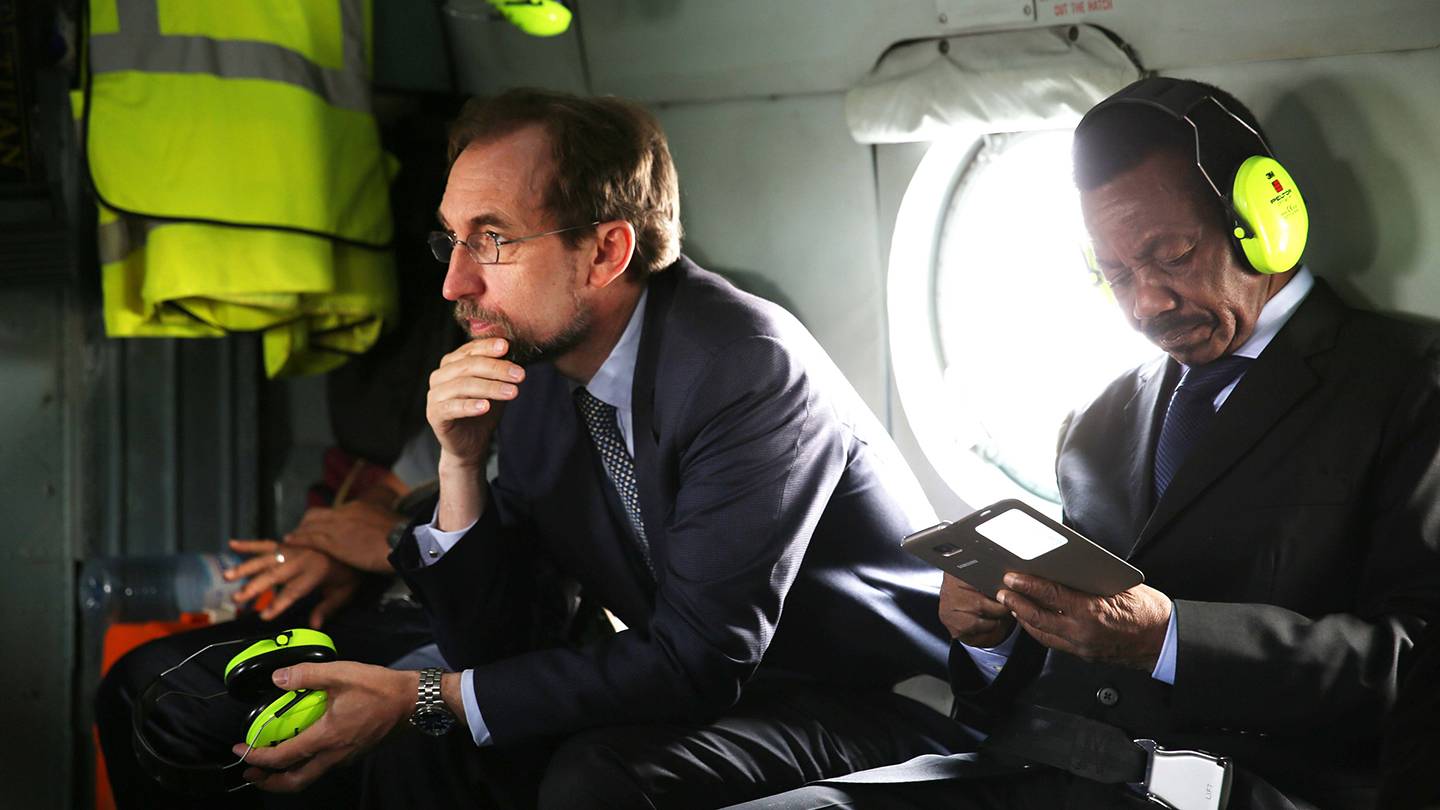
Image caption: Al Hussein aboard a helicopter to Panzi Hospital in Bukavu, a city in eastern Democratic Republic of the Congo
Image credit: Courtesy of Zeid Ra'ad Al Hussein
The idea is that if you want a second term, you have to cozy up to the P5. It was clear to me that that was not going to be possible because all five had ample reason to be upset with me because I was upset with them on a number of occasions, whether it be China or Russia. And with the Trump administration. I was attacking the president quite regularly.
You could have made concessions and tried to woo them, but you weren't willing to do that.
No. Had I suggested that I wanted a second term, I could quite easily see, for instance, the Chinese saying to me: Look, we will agree to you having a second term, but you're not going to talk about Xi Jinping or about the Uyghur population. You're not going to talk about Tibet. You're not going to talk about those in Hong Kong who are expressing dissent. The Russians would say the same about dissent and protests in Russia, or the LGBTQ community in Chechnya. They would've raised all the issues related to Crimea and Ukraine.
You'd have to sort of, in effect, emasculate yourself to stay in the position, and I wasn't prepared to do that. I would be suspicious of any high commissioner who was elected that way.
I'm sure you felt you couldn't do your job effectively.
Yes. In the end, my job was not to defend the governments. They're more than capable of defending themselves. My job is to defend those who are being deprived and discriminated against by their own governments. They're the ones who are marginalized. Those are the ones we should speak up for.
How did you and others at the U.N. define human rights?
You ask, Is the government discharging its duties with its own people, its own obligations, as per the constitution—to uphold the criminal codes, civil codes, and treaty obligations that lie at the top? If they're not, we point it out. You don't cast it as political work, but it gives you enormous political power. Because it's the one voice that they don't want to hear from. I mean, it's already bad enough when they hear it from civil society. When you hear it from a public official of an international organization, they don't like it.
On many occasions there would be utter silence. For example, [Philippine President Rodrigo Roa] Duterte would say the most appalling things. He would hear it from the civil society organizations, but he rarely heard it from his peers. You wouldn't hear [German Chancellor Angela] Merkel or [Canadian Prime Minister Jus- tin] Trudeau or any of them criticize him directly for something he said. It was just appalling. That was where we stepped in.
This is during a period when there are human rights violations happening across the globe: China, Venezuela, Turkey, Syria, Myanmar...
Everywhere.
Let's equate them to fires. There are fires raging all over. Was it part of your purview to prioritize some? Let's focus here, where things are more severe?
No, we tried to do all of it.
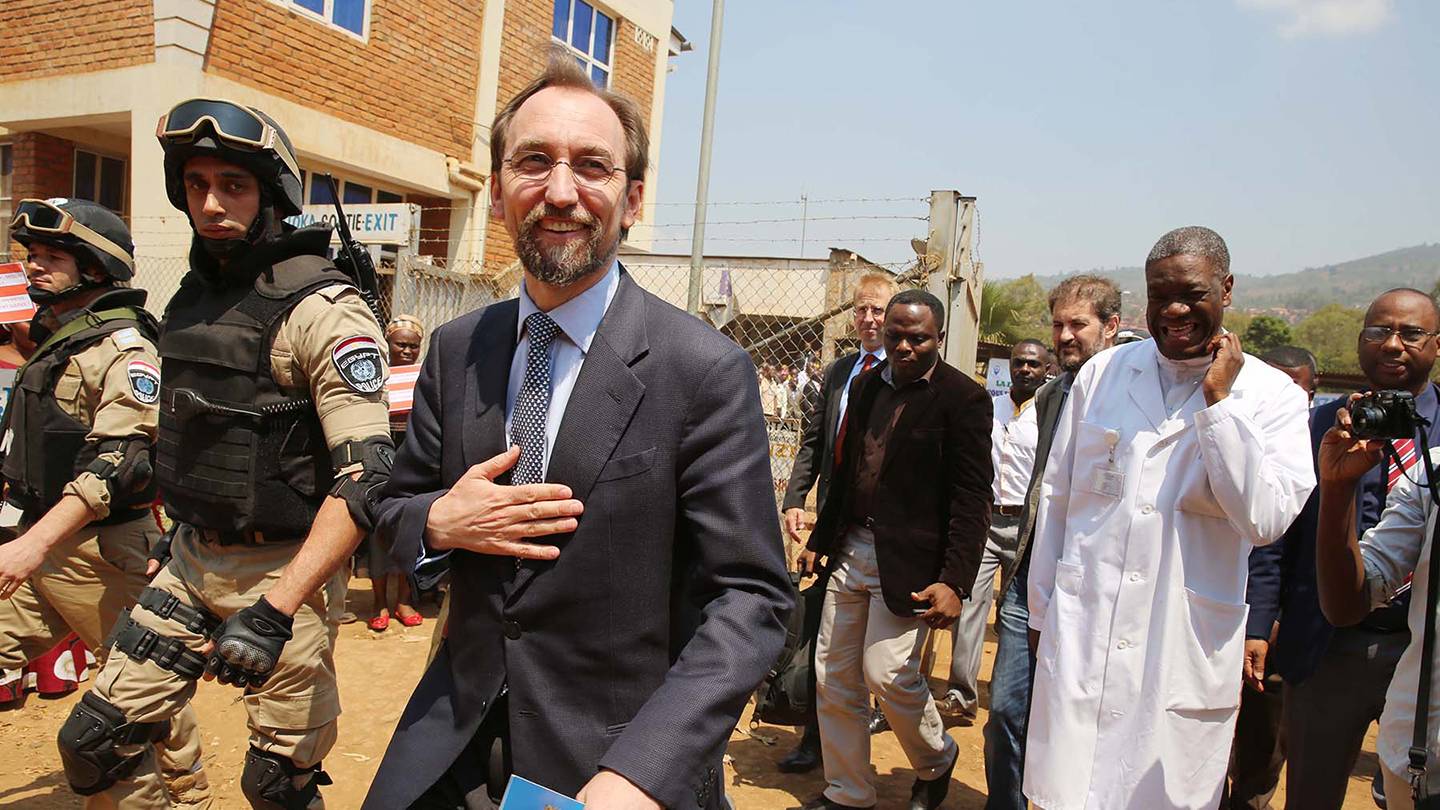
Image caption: Al Hussein tours the Panzi Hospital in Bukavu, the Democratic Republic of Congo. Gynecological surgeon Denis Mukwege (in white coat) founded the hospital and received the 2018 Nobel Peace Prize for his efforts to end the use of sexual violence as a weapon of war.
Image credit: Courtesy of Zeid Ra'ad Al Hussein
How does one go about addressing all of it?
First, consider it's not just me. I had a staff of about 1,600. Some of the best human rights lawyers we have on the planet work for the United Nations.
We would analyze all 193 countries. I like to think that by the time I finished, and I had commented on all of them, we would have an absolute condition of a country. And then you measure the delta. If it is a positive trend, or if it's declining, you seize on that. In most states there are deficits. In some cases it was drastic. Of course in the conflict states, all the rights depreciate. Every right, from civil, to political, to economic and social. Everything goes. You do pay attention to those. You do pay attention to the fragile countries. You do pay attention to the countries in the global north. You don't exclude anyone. I had to point out to the Chinese time and again that if I was prepared to criticize Bahrain, a small country in the Gulf, I would have to take the same approach with regard to China. I wasn't going to privilege any particular country.
The job was one where you basically held up a mirror to these countries, and I always rejected the phrase "naming and shaming." Because when you're torturing your own people and you're arresting them arbitrarily, when you're condoning discrimination and you allow for deprivation and so forth, I'm sorry, but you shamed yourself. I often refer to the Leonard Cohen song "Everybody Knows." We know.
I wonder how those in power justify their actions. Maybe I'm terribly naive, but you would hope that if we polled a significant group of people, we would all agree on basic human rights. So, when people violate them, perhaps they make excuses and say, "Well, you don't understand our situation. I believe in basic human rights, too, but this is a special circumstance."
You're absolutely right. In the context that I stepped into, it was the so-called war against terrorism. That this would justify doing certain things simply because speed is of the utmost necessity. You can't wait for a court order, or a judge, if you have to search for a particular person. You just do it on some emergency provisions. The poor family on the other side? They just have to grin and bear it.
What we would say to countries is: Look, you have to approach this not as a military-security issue but as a criminal justice issue with the utmost precision and stick to the law and devise systems whereby you're not undermining the rights of your people. Nietzsche said, "When fighting a monster, take care not to become the very thing you're fighting." If a particular state is deciding to use its counterterrorism provisions to settle scores with the political opposition, and they arrest someone arbitrarily, that's not the path you want to be on.
But they might say, or think, they are defending their country by their actions.
Many human rights violators think that by destroying civil society somehow you protect the central organs of the state. And that's exactly the opposite view of the one we have. It's actually a vibrant and open civil society that protects the state. Otherwise, you have a very polarized condition between a repressive, security-minded state on the one side and the armed terrorists on the other. And nowhere in between for the people to go. That's what is happening all over. You see civil society being crushed and the room for dissent just evaporating.
The flavor of the past few years has been dystopian futures. I'm talking everything from Hunger Games to Hulu's adaptation of The Handmaid's Tale. And there's one consistent thread: Societal norms and rules have deteriorated, and basic human rights and liberties have been stripped away. You might argue that is happening right now.
It's happening in many countries. The image that I tried to paint in people's minds is that we take in around 23,000 breaths a day just to live, but no one thinks about that. You don't think, if I don't draw a breath in the next two minutes, I'm dead. It's not until someone begins to strangle you that you're thinking about that next breath with all the intensity your mind can bring to it.
One day you're told, "Greg, you can't bank with us. By the way, you can't bank over there either. And you wanted a loan? Well, that's not going to happen. By the way, we don't want you to live in this neighborhood. You need to go live in another part of the state." Then suddenly you don't know where you are or whom to turn to. By the time you think like that, it's far too late because the very structures of the state designed to help you have been so corroded that they no longer exist. Then you are the plaything of a master and it's too late.
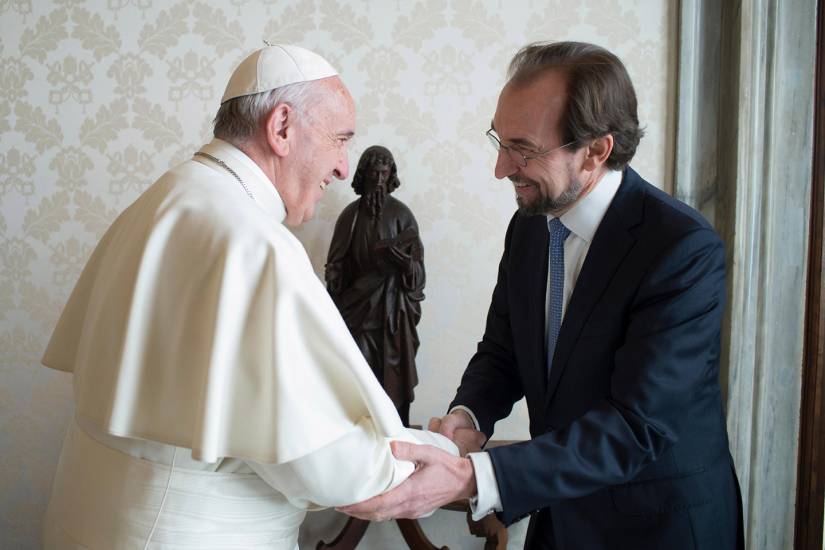
Image caption: Al Hussein meets with Pope Francis
Image credit: Courtesy of Zeid Ra'ad Al Hussein
Now you have me worried.
I think of it in the same sense as a civil union or marriage between two people. A constitution is sort of like that. You can have a brilliantly designed constitution with all the right amendments, but unless you're constantly working at making sure that the integrity of it is maintained you're going to be in trouble.
I worry about the United States. All states are works in progress. There is no state that can't be dismantled by a generation or two of reckless politicians. Some have the view that the state is immutable and can withstand shocks. Can it? You need to look at the integrity of the judiciary, the integrity of the military. You look at polarizing discourses in society. Right now I'm reading Antony Beevor's [The Battle for Spain: The Spanish Civil War 1936-1939.] In the opening chapters he explains how essentially both sides destroyed the republic. It became so polarized. When you look at many countries today, you wonder about their integrity and you wonder about the binding element that will keep them whole.
Sides that were not directly at odds before suddenly have carte blanche to openly hate.
I saw that when I went to the former Yugoslavia during my time as a U.N. peacekeeper. You see what happens when hatred just explodes out into the open. But hatred is often built on lies and built on fear. Many of the people in these communities lived together for a number of generations. Then you introduce a half lie and throw in a full lie behind it and then, watch out. That's when the frightening thing that once seemed unimaginable becomes very possible.
Human history seems rife with examples of this. It's always one side demonizing another group. Maybe it's not a case of, OK, today you're my enemy. It's more gradual than that. Like what's happening in Myanmar with the Rohingya. That one day comes where we allow human rights transgressions because one side feels this group is less than us.
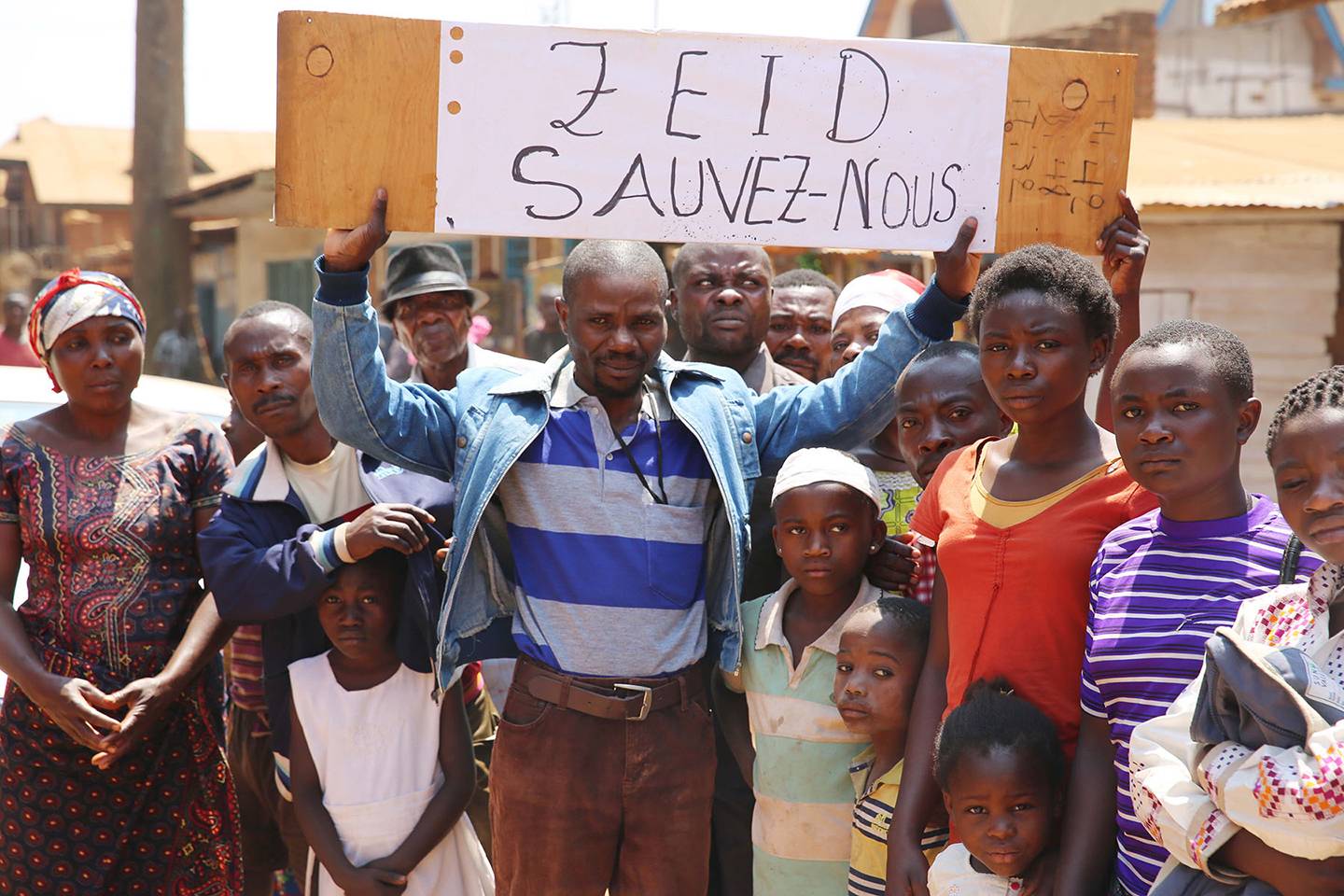
Image caption: Outside the Panzi Hospital, a man holds a sign that reads in French, “Zeid Save Us.”
Image credit: Courtesy of Zeid Ra'ad Al Hussein
Right, and you start to trigger the reptilian part of your brain. Your fear. And it begins to dominate your thinking. There are two points I always came back to when I was high commissioner. One was the series of interviews between Gustave Gilbert, a U.S. psychiatrist at Nuremberg, and Hermann Go?ring. Go?ring said exactly what you're saying. He said, "It's quite easy to mobilize a society. You basically create an enemy from without and within. And anyone who doesn't support you, you label as a traitor." Gilbert said, "But surely this doesn't work in democracies?" And Go?ring said, "No, it works in all societies." I mean, Go?ring was a diabolical man, but he sort of knew what he was talking about.
The similar thing I used to constantly go back to was the mayor of Vienna during the 1890s, Karl Lueger. He was an interesting character because he was a sophisticated mayor, not a maniac. He took anti-Semitism, which was already quite a prominent feature of the Habsburg Empire, and turned it into a more virulent form. He earned enormous political profit from it. He was asked by a journalist, "How could you be so anti-Semitic when you have Jewish friends?" He separated the two. The political dividends were so great that he could not resist an anti-Semitic course of action.
What we've seen in the last 15 years is otherwise third-rate politicians who have taken a leaf from Lueger's playbook, albeit with a different victim, and you get someone like [Jair] Bolsonaro who was once a laughable character on the fringe of Brazilian politics. He then adopts this Trump-like attitude regarding his campaigning, and suddenly he's elected president by 55% of the vote.
That's not to say that people supporting the populist are not hurting, or people are not angry. They are angry. They're angry at the banking world. No one was prosecuted in the United States when 1.3 million people lost their homes. None of the Wall Street people went to jail. You can understand that sort of thing, but there's also an application or manipulation of their fears. That has to be looked at.
Tell me about your time at Johns Hopkins. I read that your freshman roommate was Jewish, right?
Ira. His family was Orthodox from Great Neck, New York. We've remained very good friends. But at that time, Jordan and Israel had no peace treaty. I thought, Someone here has a sense of humor sticking the Arab and the Jew together [laughs]. But there really is something about being exposed to a culture that's multiethnic. In my sophomore year, I lived with four students, and it was like a cross section of the United States. We had an African American, a Chinese American, a Jewish guy, a resident hippie, and me. And I loved it. It was just a great experience.
What or who do you think best informed your sense of right and wrong, and attitudes on human rights?
I think for me, it was [my time in the] former Yugoslavia, when you saw people butchering each other on account of differences which seemed almost negligible. We couldn't tell the difference between a Croat and a Serb and a Bosnian and Albanian. They all look the same. Small differences in their names. They have certain customs and traditions. Is that enough justification to go and murder each other? I mean there was a deliberate policy of aggression pursued by Slobodan Milos?evic? out of Serbia.
I keep pointing out to my children that we're all the same. We have the same organs. We have the same body chemistry. We have the same everything. The differences in color, skin tone, height are so marginal relative to everything else about our biology. And yet we've desecrated ourselves for the better part of 200,000 years. It's mad, and we're still doing it. Those first two years at the United Nations really informed a lot of my thinking.
Yugoslavia must have been quite the learning experience.
On the second or third day in the field, I went up to what was called the Baranja region in [what is now] Croatia. There was a joint commission meeting and the person who was supposed to be chairing the commission never turned up. They said, "You're from Zagreb, right? You chair it." There I was, 30 years old, with an interpreter, chairing this meeting. It was the best lesson that life could've given me where, fresh out of all this academic training, I was suddenly in the middle of this conflict. And that basically set me on my path.
When you go into a conflict area like that, how do you observe these atrocities? What access are you given?
At the time, we had pretty much full access. The fighting was still on, continuing between the Serbs and Croats until the end of March 1994. I arrived in early February. By the end of March, that fighting was beginning to die down because they had a cease-fire in place. And at the time, the U.N. was not really targeted as such. In other words, you could be shot by a sniper but only because the sniper might be drunk. Unlike today when these organizations are targeting the U.N.
We approach those on both sides. You get them to stop fighting, [aid in the] removal of heavy weapons from the area, and offer humanitarian assistance to the people in between. You create a pause into which you then hopefully install a political compromise or a settlement. I mean, that was the theory. What was amazing to me when I was doing the brokering in that first meeting is that we would have a break and all of them would start smoking a cigarette together. So they're killing each other one day, but now they're smoking cigarettes, talking to each other. And I'd say to the interpreter, "What are they saying?"
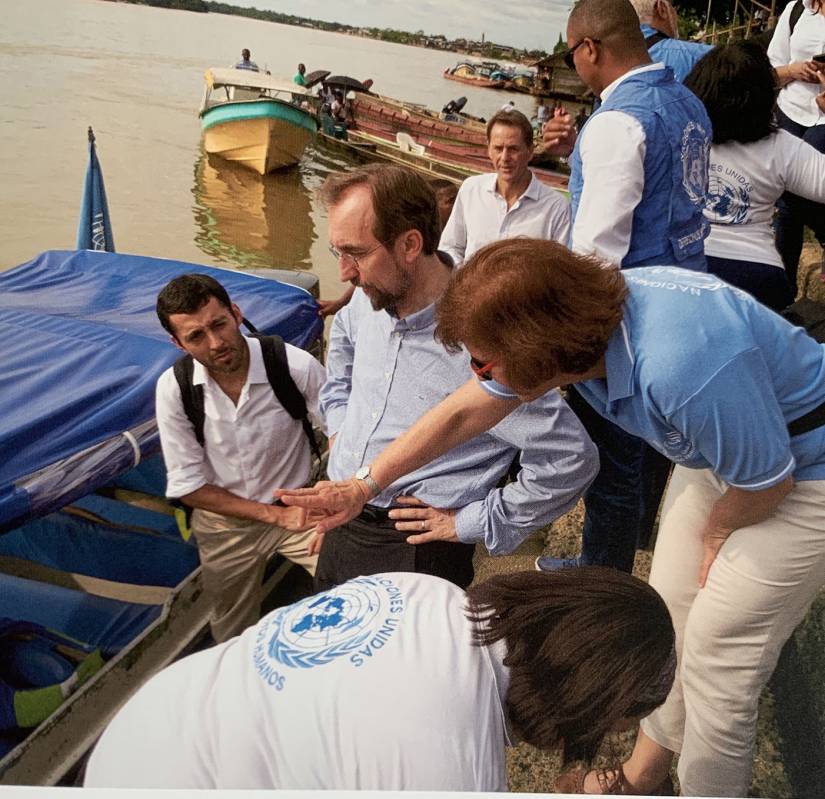
Image caption: In October 2016, Al Hussein traveled to the city of Quibdo, the capital city of Chocó Department in western Colombia to travel along the Atrato river to see the illegal gold mining operations.
Image credit: Courtesy of Zeid Ra'ad Al Hussein
She was like, "They're asking about each other's children." They live together. Their children went to school together. It was a bizarre thing. I've seen this time and again in other contexts as well, where even in the most hostile environments you find these little pieces of humanity that don't seem to fit. You're speaking in friendly terms to someone and the moment the meeting ends, you're prepared to kill them.
Most people who are going about their day right now, right here in Philadelphia, likely have little knowledge of what is going on in the Congo, Yemen, Myanmar, and North Korea. But you do. You've been to places where, in one interview, you said that a military officer stabbed a baby because the child was crying out for his mother.
Yes, that happened in Myanmar. The authorities in Myanmar blamed the group called ARSA from the Rohingya for an attack on a border post and in effect said, "They [the Rohingya] are all terrorists." And then launched a campaign against the Rohingya in northern Rakhine in 2016. I spoke to Aung San Suu Kyi, [a Burmese politician and Nobel Peace Prize laureate] and asked her to give my office access to northern Rakhine. Two weeks passed and she, in the meantime, went to Singapore. And onstage, someone asked her if it was true what has been reported in the Western press about these attacks by the military against the Rohingya population. Then she sort of almost laughed and said derisively, "These are fabrications." Then I met my staff and I said, let's investigate it ourselves. We'll send a team to Cox's Bazar [in southeastern Bangladesh] to begin to take the statements of those people who are leaving. A Swedish colleague in my office led the team, and when she came back and produced the report I looked at this and I thought: This is ISIS stuff. I mean, this stuff is so extreme. The Rakhine militia chasing down little children and slitting their throats.
This horror reminded me of a comment by Thomas Buergenthal, who for many years was a professor at George Washington Law School and was the American judge on the International Court of Justice. He was one of the youngest survivors of Auschwitz. He said at one stage, in all conflicts, it quickly goes to the extreme. Every war you think it can't be worse than this.
I listened to your impassioned New York Times op-ed video and the speech you gave at The Hague in September 2016 where you lambasted the rise of "bigoted populists," a speech you draw a lot of fire for. Sitting here right now, you're so calm and charming. But in those moments, your outrage came out.
When you're sitting there with some of these world leaders, the victims of these abuses come into your head, and you just want to look into the camera and say, "You bastards are doing this." There's a difference between humanitarians and human rights workers. Humanitarians care for the wounded, care for those who are affected. They provide shelter, bring medical support and provide some sort of physical protection. That's what the humanitarians do. The human rights people are actually pointing out the perpetrators and saying, "You've got to stop this. You've got to stop this!" It demands confrontation. You're so angry when you see this. I mean, you just can't take it after a while. The cruelty is just awful, and the pain never disappears.
We were in Sri Lanka, I think it was in 2015, and we were listening to a victim of rape. She had been raped by police, I think 35 years earlier, and for her it was still so vivid that her tears were streaming down. We were all affected. You realize that the pain just doesn't go away.
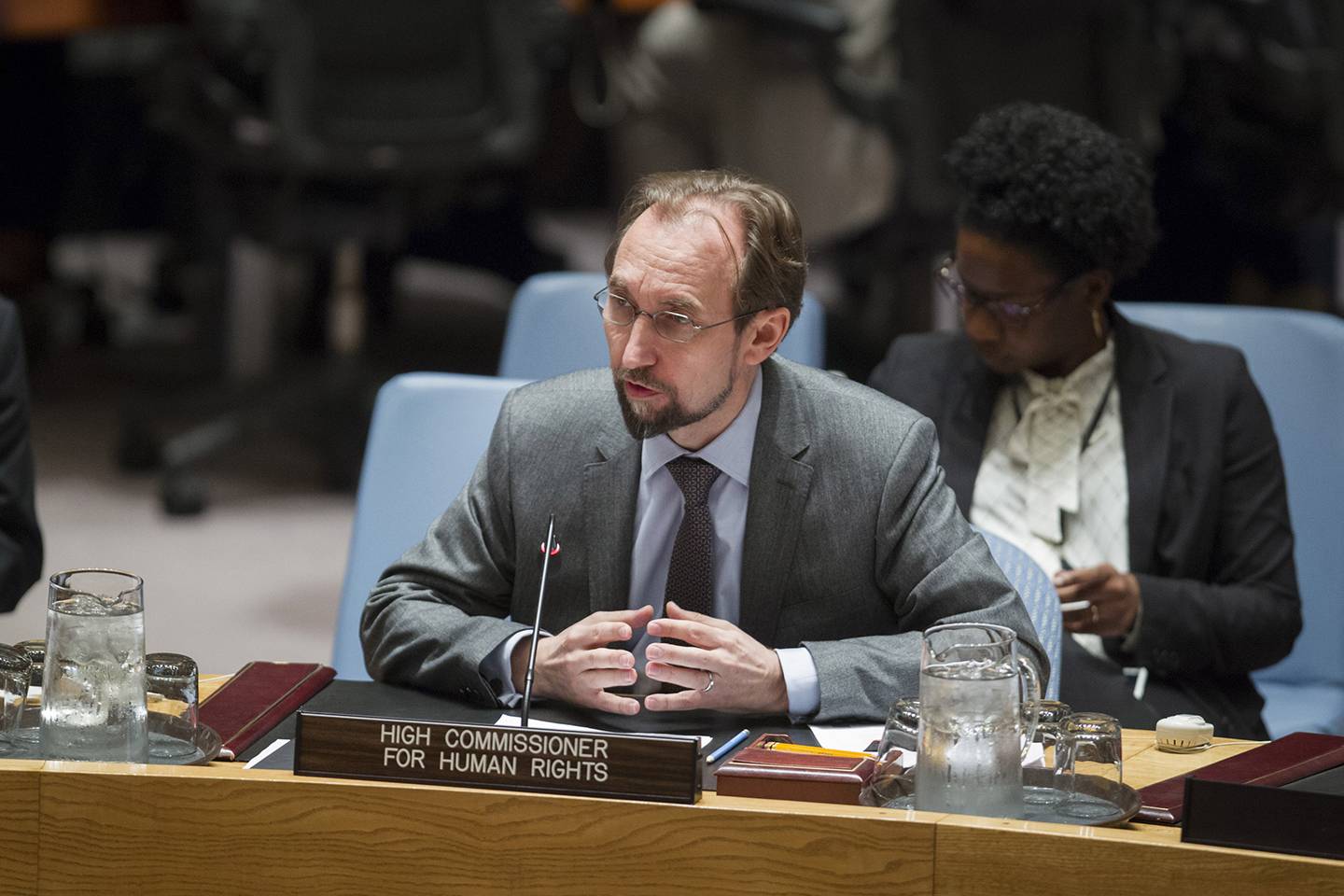
Image credit: Courtesy of Zeid Ra'ad Al Hussein
I want to go back to your Hague speech in 2016 and your recent Times op-ed. In both instances, you were calling out world leaders—Western democratically elected leaders, I must add. Their silence in the face of human atrocities, you say, is damning. What were you hoping to address on both these occasions?
You know, when Duterte goes to Mindanao and says to his soldiers, "I want you to shoot women in their vagina," it's so outrageous. You'd expect Western leaders to say something. [Hungarian Prime Minister] Viktor Orba?n says, "I don't want my people to mix with people of another color." Why aren't you saying something? There was a cacophony from civil society who would react in news stories and op-eds. But why not their peers?
From hearing you talk, you fear that this rising tide of nationalism and populism opens the gates for even more of that. We're not going to worry about other countries' problems anymore. And that way of thinking also opens us up to atrocities at home.
That's right. It's that notion that you are a traitor if you're not supporting us. Any dissent will not be tolerated. True democracies are shrinking in number. You have more authoritarian governments, and therefore you have less control in terms of the international systems in place. That's the danger here. You have more and more trip wires, and we're in a nuclear age. It's terrifying. Because it's not just the launch of ballistic missiles with warheads. It's when fissile material is made available to terrorist groups and is trafficked across borders. The scope of the dimensions of the perils that we face demand us to be quite robust. The way to do it is you confront the leaders at the top and you listen to their followers. You need to listen to, not shout at, their followers because the followers are in part a victim as well. At the top is manipulation. That's the way I see it. You achieve results, if you will, by a combination of all these measures—persuasion, conciliation, facilitation, and pressure. It could be using a moral position to assert the pressure.
Now that you're out of the U.N. machine and you're here at the University of Pennsylvania, how do you continue to fight against injustice and for human rights? Inspire others to take up your mantle?
Kofi Annan, whom I had the privilege of knowing and working with and who was a friend of mine, used to always say that you're never too old to learn and never too young to lead. Look at [Swedish activist and youth climate movement leader] Greta Thunberg at age 15. It's amazing what she's done. When you look at really smart young people, the only thing separating them from greatness is fear. If you're prepared to do what others are not prepared for, you can lead.
When I was at the Oslo Freedom Forum two months ago, I met with different groups of dissidents. What was amazing to me from the first time I saw these groups when they visited me in Geneva was their bravery. You get the impression they just didn't know what fear was. They're constantly exposed to danger and threats to their lives, and they're still willing to speak out. But what I saw in Oslo was even more amazing because they were all deeply anxious and fearful and they know what the consequences are. My estimation of them just ballooned because they were so normal, but capable of doing something that very few people can. To somehow lock it all away and go that step further to denounce this even tougher oppression or tyranny. It's what reinforces our hope and the fact that we are such an astonishing species. Where does all social progress come from? It comes from a minority view, three or four people beginning to say in a society that they can't tolerate slavery anymore. That's how we progress as human beings. Someone says, "I know that I'm going to risk my life by saying this, and I'm still prepared to do it." I mean, just mind-blowing.
Posted in Voices+Opinion, Politics+Society, Alumni
Tagged alumni, human rights




